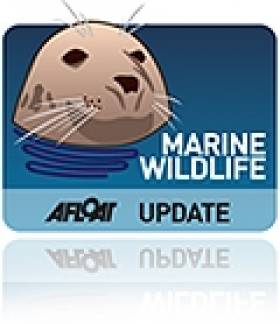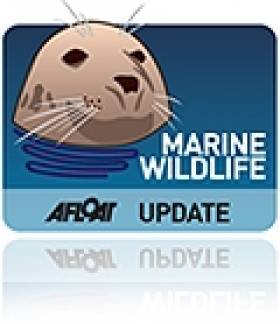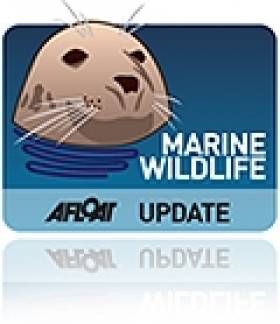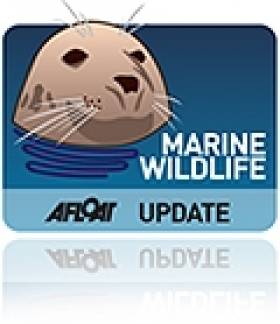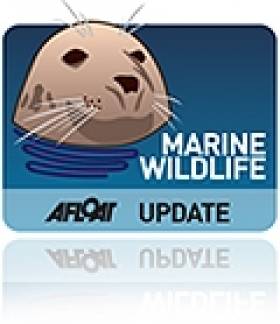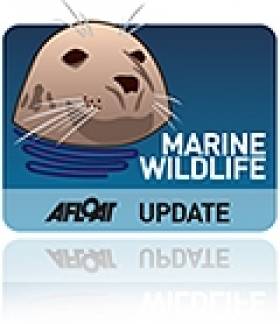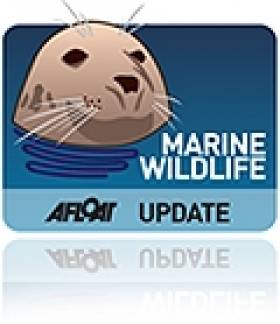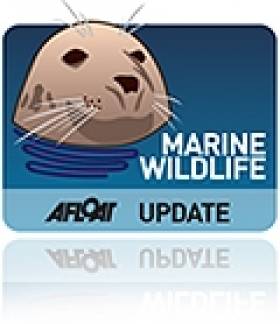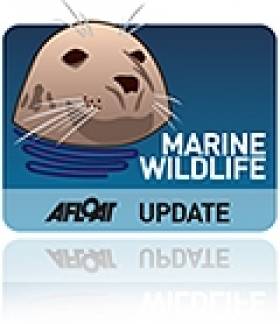Displaying items by tag: humpback whales
#MARINE WILDLIFE - Researchers with the Irish Whale and Dolphin Group (IWDG) have arrived in Cape Verde to continue their studies on the North Atlantic humpback whale.
In what is the fourth expedition by the IWDG to the islands off the west coast of Africa, Conor Ryan and Darren Craig will be collecting biopsy samples to study the whale's genetics and analyse for persistant organic pollutants in their habitat. They will also be recording whale song and collecting photo ID images.
According to the IMDG: "All these techniques are helping us to build up a picture of how isolated this population is, about the geographic range of these whales, and how large the population is."
Regular updates from the duo, including photos of local flora and fauna and marine wildlife, will be posted on their research weblog HERE.
Another Humpback Whale Sighting - This Time in Northern Ireland
#MARINE WILDLIFE - The Irish Whale and Dolphin Group (IWDG) has confirmed a new humpback whale sighting, this time in Northern Ireland.
According to the IWDG, this is the third consecutive year that a humpback whale has been spotted in Northern Irish waters, with this sighting being only the fourth ever validated record for the species in the North.
IWDG sightings co-ordinator Pádraig Whooley described it as "an important development [that] highlights a trend towards increased sightings of this large baleen whale species in Irish waters."
He also remarked on the "unusual" location of the sighting in the fast-running waters of the Strangford Narrows at the Ards Peninsula.
The discovery comes just a week after confirmed sighting of two humpback whales at the opposite end of the island of Ireland, off Galley Head in West Cork, as previously reported on Afloat.ie.
Humpback Whale Sightings in West Cork Confirmed
#MARINE WILDLIFE - This past weekend saw confirmation that two humpback whales have made an unseasonal visit to Irish waters.
As previously noted on Afloat.ie, the Irish Whale and Dolphin Group (IWDG) had received reports of a sighting of the large cetaceans by birdwatchers off Galley Head in West Cork - an event described as "unusual" by sightings co-ordinator Pádraig Whooley.
But as the Irish Independent reports, those sightings have now been confirmed after IWDG members spotted the humpback pair near The Stags at Castlehaven harbour.
The team was able to get close enough to collect skin samples as well as photo identification, which confirmed that one of the duo is completely new to these waters.
Whooley commented: "Why these two young humpbacks are here during spring, when years of data shows them to be absent in these months, is a mystery."
The Irish Independent has more on the story HERE.
Humpback Whales A Surprise April Sighting Off West Cork
#MARINE WILDLIFE - At least two humpback whales have been spotted by birdwatchers off Galley Head in West Cork, according to the Irish Whale and Dolphin Group (IWDG).
"This is the first time since the large whale project commenced in 1999 that humpback whales have been recorded along the Irish south or coast during April, which has been up till now the one month in which large whales have consistently been absent from our inshore waters," said IWDG sightings co-ordinator Pádraig Whooley.
The timing of this sighting was described by Whooley as "unusual". He also confirmed that one of the whales was recorded off Hook Head in Co Wexford in late January and early February of this year, which dispells the hypothesis that large whales leave Irish waters after the herring season in the southeast.
Meanwhile, Whooley sounded a word of caution for anyone hoping to spot the humpbacks for themselves, as the "sheer numbers of basking sharks about" often result in false sightings.
The Irish Whale and Dolphin Group has more on the story, including images, HERE.
New Season of Summer Whale Watching Courses on Cape Clear
#MARINE WILDLIFE - The Irish Whale and Dolphin Group (IWDG) has announced another series of its popular whale watching courses on Cape Clear in West Cork this summer.
The courses cater for adults keen to learn more about whales and dolphins in Irish waters and how to observe, record and identify them. They will feature a mixture of workshops and field trips, including cliff and boat-based whale watches.
Three weekend courses will take place on 25-27 May, 20-22 July and 7-9 September, led by IWDG sightings co-ordinator Pádraig Whooley. All are open to IWDG members and non-members alike, but places are limited to 20 places each weekend on a first-come-first-served basis.
Admission is €70 for IWDG members (€90 for non-members), with a non-refundable deposit of €25 required. Please note that this fee does not cover transport to Cape Clear, food or accomodation (which is limited in high summer) or any boat trips. As the itinerary will be weather-dependant, some flexibility will be required.
More information on the weekends and booking details are available at the IWDG website HERE.
In other IWDG news, the group has secured another grant from the Island Foundation to continue its humpback whale research in Cape Verde this spring and summer.
A shore-based team will be stationed in Boa Vista in an area that is "possibly the most important site for breeding humbacks in the entire northeast Atlantic".
Places Available on IWDG Whale Watch Weekends
The Irish Whale and Dolphin Group (IWDG) is offering a limited number of places to non-members on its two upcoming autumn/winter whale-watching weekends in Co Cork.
The weekends, based at the Celtic Ross Hotel in Rosscarbery, are geared towards sightings of larger marine wildlife – specifically fin and humpback whales, which are commonly sighted in West Cork between October and December.
Two weekends are scheduled, on 28-30 Octover and 25-27 November, and both will include presentations as well as plenty of whale-watching opportunities on land and at sea.
The IWDG has also negotiated a special weekend rate of €120 at the Celtic Ross Hotel which includes two nights' B&B, an evening meal and a packed lunch.
The weekends are being booked in succession, both limited to 12 bookings, with seven places currently remaining for the first weekend. The IWDG warns that the trips are not suited to anyone in poor health or prone to sea-sickness, and that as always whale spottings cannot be guaranteed.
Anyone interested in attending or wishing to enquire further can contact Pádraig Whooley at [email protected] or 023 8838761, or write to the IWDG, Dereen, Rossmore, Clonakilty, Co Cork.
Fin Whales Come Closer to Kerry Coast
Though they failed to track down the elusive humpback whales, IWDG members were recently treated to their first sighting of fin whales in Co Kerry's inshore waters.
With permission from the Haughey family to land on Inis Mhic Aoibhleáin - the most westerly point in Europe - as a vantage point, 20 members of the Irish Whale and Dolphin Group set out south towards the Scelligs following tell-tale blows.
Amid hundreds of dolphins and as many as 11 minke whales seen throughout the day, the first fin whale was found 10 miles south of the Blaskets.
Two more were spotted 4 miles northwest of Sceilig Mhichíl, both of which were biopsied.
"What we observed was spectacular activity in an area which appeared to be devoid of life just the week before," said the IWDG's Conor Ryan.
The IWDG has more on the story, including photos, HERE.
Humpback Whales Spotted Off Kerry, Dublin Coasts
Humpback whales have already returned to Irish waters, with recent impressive sightings off Dublin and Kerry, Irish Weather Online reports.
According to the Irish Whale and Dolphin Group (IWDG), a scallop fisherman reported a 'spouting' whale near his boat last Tuesday - a sighting that was later confirmed by whale-watchers along the Dingle peninsula, who photographed two whales off Slea Head.
Meanwhile, last Thursday a third confirmed sighting was made near Lambay Island, off the Dublin coast.
"You are looking for a smallish whale, broad in shape, 25-35ft in length, with a definite 'bushy' blow, and a pronounced hump forward of the dorsal fin," said the IWDG's Pádraig Whooley.
"They are likely to be quite visible on the surface, in contrast with minke whales who rarely exhibit a visible blow and are only briefly on the surface between long dives. Humpbacks may also be curious towards boats."
Irish Weather Online has more on the story, including images, HERE.
More Whales Spotted in Irish Waters
Killer whales and a humpback whale have been spotted off the coast of Northern Ireland in recent weeks, according to the Irish Whale and Dolphin Group (IWDG).
Irish Weather Online quotes the IWDG's Pádraig Whooley, who said three killer whales - or orcas - had been seen off Rathlin Island in Co Antrim on 10 June. Two more were later spotted between the Down coast and the Isle of Man.
Then on 14 June a humpback whale was sighted off Bangor - only the third time the species has been seen in Northern Irish waters.
"Any sighting today of a humpback whale sends out a very strong conservation message," said Whooley.



























